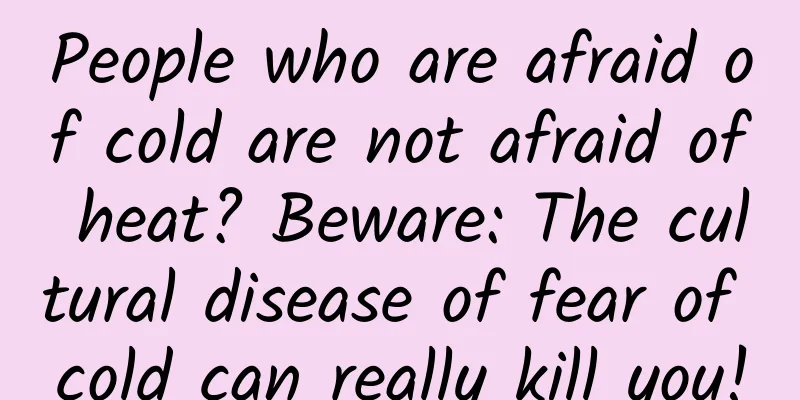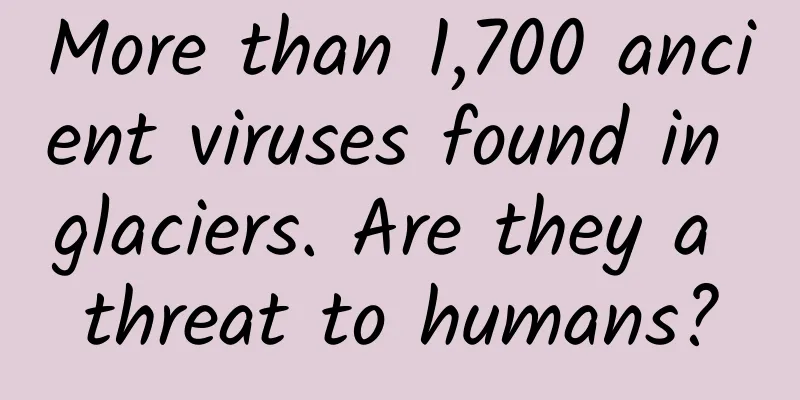People who are afraid of cold are not afraid of heat? Beware: The cultural disease of fear of cold can really kill you!

|
Author: Dr. Li Changqing, a practicing physician in the United States Reviewer: Wang Chenguang, PhD in Biology, former professor of Peking Union Medical College gossip In hot weather, while some people lament that "the air conditioner gave us our lives", there are still many others, including medical workers, who are deeply influenced by the traditional culture of "fear of cold" and are overly cautious about using air conditioners, and have put forward many so-called "scientific taboos". They may also feel that they are not afraid of heat, and thus neglect to take cooling measures. However, are these people really more heat-resistant and safer in summer? analyze June of 2023 tied the historical record with 14 high-temperature days (the same number of high-temperature days was previously reached only in July 2000). In July, the whole of North China continued to experience continuous high-temperature weather. Copyrighted stock images, no reproduction is authorized The biggest health threat from high temperatures is heat illness, of which heat stroke is the most dangerous. Almost every major heat wave causes a large number of heat strokes, only a few of which are reported. The first death from heat stroke reported in Beijing this year was a 57-year-old. In many countries, heat stroke kills more people than all other natural disasters combined. As the global climate crisis intensifies, this threat will only become more apparent. What is heat stroke? In simple terms, heat stroke is severe heatstroke. When the body's ability to dissipate heat is unable to withstand high temperatures, the body temperature rises sharply. Continuous high temperatures damage temperature-sensitive nerve tissues, causing neurological symptoms such as headaches, dizziness, cramps, and even coma, which in turn damage multiple systems such as the cardiovascular and digestive systems. Many heat stroke survivors will have neurological dysfunction, including but not limited to dementia, ataxia, motor and sensory disorders, and the severity is comparable to that of a severe stroke. Heat stroke is a critical illness with a very high mortality rate. The mortality rate of untreated severe heat stroke patients exceeds 10%. The mortality rate will be even higher for the elderly, infants, and patients with underlying diseases. The causes of death from heat stroke are mostly cerebral edema, shock, heart failure, coagulation disorders, and some patients may also experience symptoms such as gastrointestinal bleeding. Who is more likely to suffer from heat stroke? Unlike many diseases, the cause of heat stroke is very clear, which is high temperature. Therefore, in modern society, it is a relatively easy disease to prevent. The best weapon that human technology can provide to prevent heat stroke is air conditioning. Copyrighted stock images, no reproduction is authorized The Centers for Disease Control and Prevention (CDC) in the United States regards air conditioning as the primary measure to prevent heat-related diseases, and recommends staying in an air-conditioned environment as much as possible during a heat wave. If there is no air conditioning at home, it is recommended to go to public places with air conditioning to escape the heat, such as shopping malls, train stations, etc. Even staying in an air-conditioned environment for a few hours a day can greatly reduce the incidence of heat illness. The CDC also emphasizes not to rely on fans for cooling. When the temperature and humidity reach a certain level, fans will no longer have the effect of cooling and preventing heat stroke. Other means such as drinking more water and wearing less clothes are only of auxiliary value in extremely high temperature conditions. Most cases of heat stroke occur in environments without air conditioning. In the 1990s, Chicago was hit by two heat waves. The 1995 heat wave killed 750 people, most of whom were poor people and the elderly living in the city center. They had no air conditioning and dared not open the windows due to public security issues. After that, air conditioning was installed on a large scale in the area. When the heat wave hit again in 1999, the death toll dropped to 80. The investigation found that many of those who died of heat stroke this time were mentally ill patients who did not turn on the air conditioner during the heat wave. During the heat wave of the same year, a survey conducted in Cincinnati, Ohio, also found the same trend. During heat waves in other parts of the world, it was also found that schizophrenia patients had about three times the risk of dying from heat stroke than ordinary people. Part of the reason is that most schizophrenia patients live alone and have a disorder of their own feelings. High temperatures will aggravate this cognitive dissonance, leaving them in a state of "not knowing the heat." Some of these people live in areas lacking air conditioning, while others have a disorder of feelings that makes them not know they should turn on the air conditioner. The investigation of some death scenes also conforms to this conclusion. When many mentally ill patients were found, the room was stuffy and hot, and the air conditioner was turned off. In addition, the hot and stuffy weather made it easy for the bodies to rot, and most of the scenes were horrible. "Air-conditioning disease" and "fear of cold" are both cultural diseases Air conditioning has many advantages. It can precisely control temperature and humidity, making people feel more comfortable. In addition, air conditioning is equipped with a filtration system that can effectively remove pollutants from the external environment and has a certain preventive effect on respiratory infectious diseases that are prone to occur in high temperature environments. Its disadvantage is that it relies on energy. However, there are still many people who are unwilling to use air conditioners, or dare not use them safely, creating some taboos that have no scientific evidence. Many people also experience various symptoms such as headaches, fatigue, and joint pain when using air conditioners. However, this phenomenon is obviously regional, especially common among East Asians, and almost every Chinese has such cases around them. This fear of air conditioning is also seen among healthcare professionals. Behind almost every news about heatstroke prevention and cooling, there will be experts suggesting that air conditioners should not be used for too long, should not be blown directly at people, should not be set to too low a temperature, and should not blow wind behind the head (the so-called "gods are afraid of wind behind the head"), etc. Copyrighted stock images, no reproduction is authorized Our cultural and geographical neighbor South Korea has a similar situation. South Korea also has many traditional taboos about coldness, just like us, such as the Chinese familiarity that women who have just given birth cannot touch cold water during confinement. There is also a word in Korean that is specifically used to describe the discomfort of being exposed to cold, which is translated as "air-conditioning disease". This word is also used by Chinese people, but it seems to only appear as a professional term in articles published by Koreans. There are also Korean doctors who have been interviewed by the media to talk about how to prevent "air-conditioning disease", and their theories and suggestions are similar to those of Chinese experts. This excessive fear of cold is almost 100% culturally influenced. In academia, there is a special term called "frigophobia", which is considered to be a mental disorder closely related to Chinese culture. Not only do patients deliberately avoid cold and cool food, air and objects, but they also have a cultural fear of cool things, believing that these things are yin, and excessive yin will affect health and even cause death. Women are considered to have a yin constitution, so fear of cold is more common in women. Among men, there is an extreme manifestation called "penis shrinkage", which believes that cold will cause the penis to shrink into the abdominal cavity, thus causing death. The scrotum does shrink into the abdominal cavity in extreme cold, but this is not the same concept as penis shrinkage. Most patients with penis shrinkage have no abnormalities in their external genitalia, and the symptoms mostly come from psychological fear. Whether it is cold fear or penis shrinkage, they are specific anxiety disorders formed under the long-term influence of a particular culture. The symptoms of so-called air-conditioning disease will disappear automatically as long as you leave the air-conditioned environment, and there is no evidence that it can leave long-term damage. This kind of symptom rooted in a specific cultural background is classified as a cultural disease. Its characteristic is that the symptoms are derived from a certain cultural understanding and lack an objective pathological and physiological basis. Ethnic groups around the world have their own unique cultural diseases. Fear of cold, fear of ejaculation, and worry about "kidney deficiency" are mainly seen in cultural circles influenced by traditional Chinese medicine and Taoist culture. Some cultural diseases are harmless to health, but some are health-threatening, and chills are one of them, especially in the context of frequent and increasing extreme high temperatures. Culture has a significant impact on a person's perception. Chills not only make people overly panic about cold things, but also increase their tolerance for heat and make them feel less afraid of heat. However, feeling that you are not afraid of heat does not necessarily mean that you are less likely to get heat stroke. On the contrary, you are more likely to get it because you reject cooling measures. This can be compared to the mentally ill patients who "don't know the heat" due to sensory disorders mentioned above. In fact, cold fear, a mental disorder that stems from cultural myths, is similar to schizophrenia in that it delays heatstroke prevention. Their self-perception of not being afraid of heat is actually more like "not knowing the heat", which is a subtle cognitive disorder. Cognitive dissonance can hinder people's instincts, leading to the loss of the ability to save themselves from fever, whose causes and prevention methods are simple and clear. There is still a lack of research on the correlation between chills and heat stroke, but almost every year there are reports of heat stroke caused by unwillingness or fear to turn on air conditioning (some of which are due to economic reasons), and death cases are not uncommon. Solution On one hand, there is heat stroke, which has a very high mortality rate, and on the other hand, there are symptoms caused by psychological fear caused by traditional culture; the former may cause serious organ damage or even death if not handled with care, while the latter are just some reversible symptoms. With the intensification and frequent occurrence of extreme high temperature weather, it is easy for ordinary people to make a choice. But in fact, it is not easy to break the paranoia caused by this cultural disease. Such paranoia will not only affect oneself, but also others. I believe that many people have encountered patients with this cultural disease. Not only do they dare not turn on the air conditioner themselves, but they also prevent others from using the air conditioner. And sometimes it is harder to convince them than to climb to the sky: any scientific reason is difficult to break through this ideological fortress built by cultural memes. Copyrighted stock images, no reproduction is authorized To crack down on such behavior, the whole society needs to do long-term correction work at the cultural level. First of all, people need to understand the dangers of heat disease. Although heat stroke is a common emergency, ordinary people do not have enough knowledge about heat disease. Most people's experience is limited to common mild heat stroke, and they do not understand the pain and risks (including sequelae) of severe heat disease. Secondly, scientific knowledge on the prevention and treatment of heat diseases should be popularized. Many folk remedies for heatstroke prevention and some commercial heatstroke prevention products are almost harmful rather than beneficial, such as some traditional Chinese medicines for heatstroke prevention containing alcohol. To alleviate people's fear of air conditioning, professionals should avoid promoting unnecessary taboos about air conditioning, and publicize the importance of air conditioning and the dangers of not turning on air conditioning in extremely hot weather. In some public places, people who are afraid of cold may occasionally ask to turn off the air conditioner, which may even lead to quarrels and disputes. This requires on-site service personnel and managers to treat air conditioners as public health products and not violate common sense for the sake of some people and harm the health of others. If necessary, consider arranging people with similar requests to a separate space without air conditioning. For those conservatives who don't listen to scientific principles, perhaps we can reason with them from the perspective of traditional culture (don't worry about whether it is scientific for the time being): the ancients summarized the six factors that cause disease as wind, cold, heat, dampness, dryness and heat. You cannot only be afraid of cold but not heat; the theory of yin and yang emphasizes balance, and air conditioning is a balance for overheated weather. As a last resort, we may be able to cruelly tell them the survey results mentioned above: Psychiatric patients do not turn on the air conditioner because they "don't feel hot", so they become a high-risk group for heat stroke. in conclusion Influenced by cultural psychology, the "not afraid of heat" of cold-fearing people may be a subtle cognitive dissonance. Their "not knowing the heat" is similar to schizophrenia, and both are high-risk groups for heat stroke. There is no evidence that the so-called "air-conditioning disease" that comes from this will cause long-term damage. Therefore, in extremely hot weather, we should actively take measures to prevent heatstroke and cool down. To crack the irrational behavior of not using air conditioning, the whole society needs to do long-term correction work at the cultural level. Reference Links: 1. Perera DN, Panduwawela S, Perera MH. Frigophobia: a case series from Sri Lanka. Transcult Psychiatry. 2014 Apr;51(2):176-89. doi: 10.1177/1363461513501711. Epub 2013 Sep 26. PMID: 24071746. 2. Naughton MP, Henderson A, Mirabelli MC, Kaiser R, Wilhelm JL, Kieszak SM, Rubin CH, McGeehin MA. Heat-related mortality during a 1999 heat wave in Chicago. Am J Prev Med. 2002 May;22(4):221-7. doi: 10.1016/s0749-3797(02)00421-x. PMID: 11988377. 3. Kaiser R, Rubin CH, Henderson AK, Wolfe MI, Kieszak S, Parrott CL, Adcock M. Heat-related death and mental illness during the 1999 Cincinnati heat wave. Am J Forensic Med Pathol. 2001 Sep;22(3):303-7. doi: 10.1097/00000433-200109000-00022. PMID: 11563746. The article is jointly produced by Science Rumor Refutation x Fanpu. Please indicate the source when reprinting. The cover image and images within this article are from the copyright gallery. Reprinting and quoting them may lead to copyright disputes. |
<<: You saved the calf with good intentions, but ended up causing the calf to be euthanized?
>>: Airplanes are becoming more and more bumpy. Is this really due to climate change?
Recommend
What are the people who are selling skewers selling?
Demi-Gods and Semi-Devils, which eight parts are ...
How to choose bidding software for bidding promotion?
When we do bidding promotion, we will come into c...
Confirmed! Apple will completely ban 32-bit applications, 200,000 apps will be removed from the shelves
With the release of iOS 11 this year, Apple has d...
Where do the "wanderers" in the universe come from? It's related to this "tidal bridge" | Science and Technology Weekly
Compiled by Zhou Shuyi and Pingsheng Aspirin may ...
Lose 3 kg in 10 weeks, and reduce waist circumference by 3 cm! This is an effective way to lose weight.
Compiled by: Gong Zixin Global estimates for 2022...
Isn’t it really a waste of money to spend so much money on protecting wildlife?
Protecting wildlife can help the Earth have a hig...
How to obtain seed users during cold start?
In my previous company, I was involved in product...
Thinking about B-side new media operation
In recent days, my friends' circles have been...
The better your product is, the less important customer satisfaction is.
The customer is God; 0 negative reviews is the gr...
All mobile practitioners should know: What exactly is deep linking?
In recent years, as startups have used, improved,...
If iOS 13 can no longer download WeChat, will you still use iPhone?
In 2019, Apple sent an email to all APP developer...
High hourly rents scare off users. Why are shared power banks trapped in their carefully woven business models?
The ever-increasing prices of shared power banks ...
On this grassland in Sichuan, there are plateau sacred birds and the first wolf protection station
Ten years ago, on the Ruoergai grassland , herder...
SEM promotion from word selection to optimization, 3 major routines!
In SEM advertising, we often spend most of our ti...
The coldest weather in history meets the hottest weather in history - A brief discussion on the extreme abnormality of the weather during this year's National Day holiday
1. The meaning of extreme and abnormal In order t...









